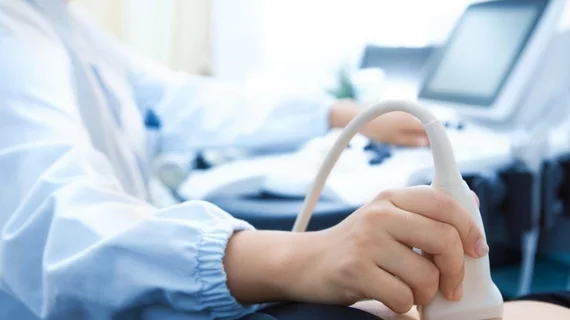Radiologists must ditch ‘illusion’ of handling all POCUS exams, work with clinicians on path forward
Radiologists must put turf wars aside and work with clinicians to accelerate the use of point-of-care-ultrasonography (POCUS), two imaging experts argued in a new editorial.
Advances in portable ultrasound have made systems cheaper and more accessible, with clinicians increasingly gaining experience using these handheld imaging tools. As such, it’s “plausible” non-radiologists will be in a position to take over many imaging tasks traditionally covered by rads, Thomas C. Kwee, MD, PhD, and Robert M. Kwee, MD, both rads with university medical centers in the Netherlands, wrote Tuesday in the European Journal of Radiology.
And while some imaging providers may dig their heels into the sand to protect their turf, growing workloads and clear patient benefits should present POCUS-sharing as an opportunity rather than a threat.
“It is an illusion to assume that radiologists will be able to cover all of these ultrasonography studies in a hospital by themselves around the clock in a timely manner,” Thomas Kwee, of University Medical Center Groningen and Robert Kwee, with Zuyderland Medical Center, explained March 30. “The increasing use of ultrasonography by clinicians should be regarded as an opportunity to mitigate workload for radiologists.”
Historically, the battle over ultrasonography has been fierce. And attempts have been made to differentiate POCUS from other ultrasonography exams. This, the pair noted, is likely a symptom of ongoing battles.
What’s really needed, the authors explained, is cooperation between radiologists and clinicians to leave a proportion of exams to non-rads.
Both authors argued the key question is asking which exams should be performed by whom. The answer: what is best for patients.
Of course, this depends on many variables and should be agreed upon by radiologists and clinicians at an individual hospital level, rather than governed by a regional body or national authority, the pair wrote in the editorial.
And decisions should be primarily based on available expertise, time frame for exams, radiologist workforce, and clinicians willing and able to learn POCUS.
As stated by both the American College of Radiology and European Society of Pediatric Radiology, training and accreditation are essential. And rads should take a leading role in teaching others how to perform POCUS exams.
Read the entire editorial here.
Related POCUS Ultrasound Content:
VIDEO: Point-of-care ultrasound systems at ACC 2022
Radiologists must ditch ‘illusion’ of handling all POCUS exams, work with clinicians on path forward
Wide adoption of primary-care POCUS deemed feasible but not immediately advisable

